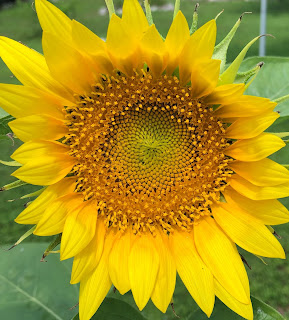One more benefit of having feeders to attract birds to the back yard - unexpected sunflowers popping up around the yard! And while the squirrels stole most of the the flowers as soon as they bloomed, this one seems to have made it! So today, I decided to get up close and personal with these favorite flowers of mine!
As I pulled out my loupe, I noticed that each of the small flowers inside of the main flower made a star! And each had small fuzzy stems coming out of each one. Having seen sunflower seeds harvested from a sunflower, I knew each of these small stars would form an individual seed. But how? I wondered.
What I learned
In learning about how sunflowers reproduce, I actually learned three words I had not previously known: inflorescence, protandrous and homagany.
* Each sunflower head has between 1,000 and 2,000 tiny little flowers, called disc florets joined together at the base. These are surrounded by the bright yellow petals called ray florets. Ray florets are good for nothing other than attracting the attention of pollinators (and making passerbys like me smile!). The petals will fall off as the seeds mature. Inflorescence is the term for a flower within a flower.
* I have read two different positions on how the disc florets begin flowering. One said they start from the outer rim to the inner circle. Another says it starts at one side of the head and open in rows about 4 rows at a time. Looking at the photo at the top of this post, I'd say the former is correct, and they open radially.. at least this sunflower did :)
* I did find a website that says the disc florets open early in the morning, releasing anthers to form a tube; later in the same day pollen and the flower’s stigma extend, while the tube itself retreats. To my eye, there was no difference in the length of the corolla between the evening and the morning, but in these side by side photos, you can clearly see the anthers are extended much further in the earlier picture, and the corolla has extended to enclose the anthers in the second photo.
pollinated for the plant to mature (which I am guessing is when the seeds are done?)
* I have read a few sites that say that sunflowers can be pollinated via homogamy. This is when the stigma curl down and pollinate the anthers.
* And finally, sunflower heads do not turn to face the sun, but instead face east. Their head is too heavy and their stem to thick. So that awesome Helen Keller quote "Keep your face to the sunshine and you cannot see the shadow. It's what sunflowers do." Nice sentiment, but not factually based :)







No comments:
Post a Comment